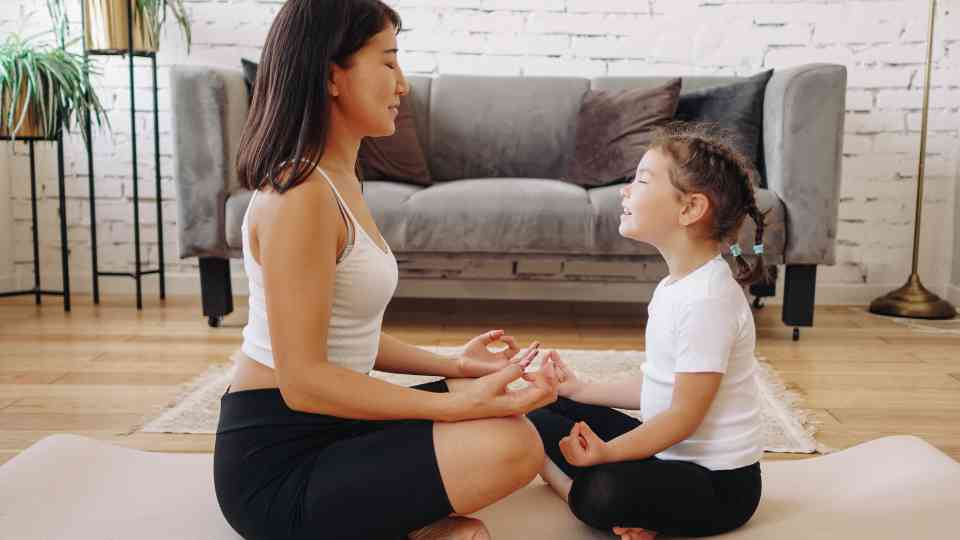Mindfulness: In today’s fast-paced world, mindfulness has emerged as a powerful tool to bring balance, clarity, and peace into our lives. By simply anchoring ourselves in the present moment, we can transform stress into serenity and chaos into calmness. Whether you are new to mindfulness or looking to deepen your practice, this guide will help you understand its essence and benefits.

What Is Mindfulness?
Mindfulness is the art of living in the present moment with full awareness and without judgment. It’s about observing your thoughts, emotions, and sensations as they arise, accepting them with kindness and curiosity.
Mindfulness is not about stopping your thoughts; it’s about learning to observe them without getting swept away.
This practice has roots in ancient traditions, but its relevance in modern life is undeniable, helping us cope with stress, improve focus, and foster emotional resilience.
Benefits of Mindfulness
Mindfulness is much more than a stress-relief technique; it’s a way of life that offers profound physical, mental, and emotional benefits. Here are a few ways it can enhance your well-being:
- Reduces Stress and Anxiety: Regular mindfulness practice lowers cortisol levels, helping you stay calm in challenging situations.
- Enhances Focus and Productivity: By training your mind to stay present, you can tackle tasks with greater efficiency.
- Improves Emotional Regulation: Mindfulness helps you respond thoughtfully rather than react impulsively to situations.
- Boosts Physical Health: Studies show that mindfulness can reduce blood pressure, improve sleep, and even strengthen the immune system.
- Promotes Happiness: Cultivating gratitude and presence increases overall life satisfaction and joy.
Simple Ways to Practice Mindfulness
Mindfulness doesn’t require hours of meditation or special tools. Here are practical ways to incorporate it into your daily routine:
1. Mindful Breathing
Take a few moments to focus on your breath. Notice the rhythm of your inhale and exhale. If your mind wanders, gently guide it back to your breath.
2. Mindful Eating
Savor each bite of your food. Notice the textures, flavors, and aromas. Eating mindfully can enhance your relationship with food and improve digestion.
3. Body Scan Meditation
Close your eyes and bring your attention to different parts of your body, from head to toe. This practice helps release tension and increases awareness of physical sensations.
4. Gratitude Journaling
At the end of the day, write down three things you are grateful for. This simple practice shifts your focus from problems to positivity.
5. Mindful Walking
Take a walk outdoors, paying attention to the sensation of your feet touching the ground, the sound of the breeze, and the beauty of nature.
General Questions About Mindfulness
- What is mindfulness?
Mindfulness is the practice of being fully present in the moment, aware of your thoughts, feelings, and surroundings without judgment. - What is the purpose of mindfulness?
The purpose is to reduce stress, improve focus, and cultivate emotional balance by staying anchored in the present moment. - Is mindfulness a religious practice?
While mindfulness has roots in Buddhist traditions, it is a secular practice accessible to people of all beliefs. - Can anyone practice mindfulness?
Yes, mindfulness is for everyone, regardless of age, background, or experience. - How does mindfulness differ from meditation?
Meditation is a focused mindfulness practice, while mindfulness can be integrated into everyday activities.
Benefits of Mindfulness
- What are the benefits of mindfulness?
Mindfulness reduces stress, improves focus, enhances emotional regulation, and boosts overall well-being. - How does mindfulness reduce stress?
Mindfulness helps calm the mind by focusing on the present, reducing overthinking and worry. - Can mindfulness improve sleep?
Yes, mindfulness can help you relax, quiet the mind, and prepare for restful sleep. - Does mindfulness improve productivity?
Yes, by enhancing focus and clarity, mindfulness can improve efficiency and decision-making. - Can mindfulness help with anxiety?
Mindfulness teaches you to observe anxious thoughts without becoming overwhelmed, reducing their impact.
Mindfulness Practices
- What is mindful breathing?
Mindful breathing is focusing on your breath, observing its rhythm, and using it to anchor your awareness. - What is a body scan meditation?
It\u2019s a mindfulness exercise where you focus on sensations in different parts of your body, promoting relaxation. - How do you practice mindful eating?
Pay attention to the flavors, textures, and smells of your food while eating slowly and without distractions. - What is mindful walking?
Mindful walking involves focusing on the sensation of your feet touching the ground and the rhythm of your steps. - How long should a mindfulness practice last?
Start with 5-10 minutes daily and gradually increase as you become comfortable.
Mindfulness for Specific Groups
- Can children practice mindfulness?
Yes, mindfulness can help children improve focus, emotional regulation, and self-awareness. - How can mindfulness help teenagers?
It helps teenagers manage stress, improve concentration, and build resilience. - Is mindfulness beneficial for seniors?
Yes, it can improve cognitive function, emotional well-being, and reduce feelings of loneliness. - Can mindfulness help working professionals?
Absolutely, it boosts productivity, reduces workplace stress, and improves decision-making. - Can mindfulness help students?
Yes, mindfulness enhances focus, memory retention, and reduces exam stress.
Science of Mindfulness
- What does science say about mindfulness?
Studies show mindfulness reduces cortisol (stress hormone), improves brain function, and enhances emotional health. - How does mindfulness affect the brain?
It strengthens areas responsible for focus, emotional regulation, and resilience, like the prefrontal cortex. - What hormones are influenced by mindfulness?
Mindfulness can lower cortisol and increase serotonin, promoting relaxation and happiness. - Can mindfulness impact physical health?
Yes, it can lower blood pressure, boost the immune system, and improve sleep. - Is mindfulness effective for chronic pain?
Yes, mindfulness helps manage chronic pain by reducing emotional reactivity to discomfort.
Common Challenges
- What if I can\u2019t stop my thoughts during mindfulness?
It\u2019s normal. The goal is to observe your thoughts without judgment and gently return to your focus. - Why does mindfulness feel hard at first?
Training the mind takes practice, just like building any new habit. Be patient with yourself. - What if I don\u2019t have time for mindfulness?
Start small. Even 1-2 minutes of mindful breathing can make a difference. - Can mindfulness make you emotional?
Yes, mindfulness can bring suppressed feelings to the surface, which is a natural part of emotional healing. - Why do I feel restless during mindfulness?
Restlessness is normal. It\u2019s an opportunity to observe and accept the discomfort without reacting.
Getting Started
- How can I start practicing mindfulness?
Begin with simple techniques like mindful breathing or guided meditations for a few minutes daily. - Do I need special tools for mindfulness?
No, all you need is your attention and willingness to practice. - What are the best mindfulness apps?
Popular apps include Headspace, Calm, and Insight Timer. - Are guided meditations helpful?
Yes, they provide structure and guidance, especially for beginners. - Can mindfulness be practiced in groups?
Yes, group mindfulness sessions can offer support, motivation, and shared energy.
Advanced Mindfulness
- What is mindfulness-based stress reduction (MBSR)?
MBSR is an evidence-based program that combines mindfulness and yoga to reduce stress. - How can mindfulness improve relationships?
Mindfulness fosters empathy, active listening, and non-reactive communication. - What is mindful journaling?
It\u2019s writing down thoughts and feelings mindfully, promoting self-reflection and clarity. - How can mindfulness help with addiction?
It builds awareness of triggers and cravings, promoting healthier coping mechanisms. - Can mindfulness enhance creativity?
Yes, by clearing mental clutter, mindfulness helps you access deeper levels of creativity.
Practical Integration
- Can mindfulness be practiced at work?
Yes, take short mindfulness breaks, practice mindful breathing, or focus fully on one task at a time. - Can mindfulness be combined with exercise?
Absolutely, mindful yoga, running, or stretching enhances both mental and physical benefits. - How can mindfulness be used in parenting?
Mindful parenting involves staying present, listening attentively, and responding calmly to your child\u2019s needs. - What is mindful listening?
It\u2019s giving your full attention to someone, hearing their words without interrupting or judging. - Can mindfulness become a lifestyle?
Yes, by integrating mindfulness into daily activities like eating, walking, and working, it becomes a natural way of life.
Incorporating Mindfulness in Your Life
To make mindfulness a lasting habit, consistency is key. Start with just five minutes a day and gradually increase the duration. You can also explore guided meditations, apps, or mindfulness classes to deepen your practice.
At DrRituGoyal.com, we believe in empowering individuals to live balanced, fulfilling lives. Mindfulness is one of the pillars of holistic well-being, and we are here to guide you on this transformative journey.
Conclusion
Mindfulness is more than a practice; it’s a way of being that allows you to live fully in each moment. By embracing mindfulness, you can unlock inner peace, enhance your overall health, and create a life of joy and fulfillment.
Ready to Begin? Start your mindfulness journey today and explore more about holistic healing and chakra alignment at DrRituGoyal.com. Your path to a serene and balanced life begins now.

